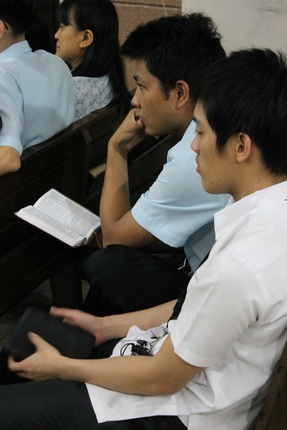 by Dr. Timothy Berrey I recently read Gerald Bray’s The Doctrine of God. Bray is an evangelical (in the Church of England), and we could not give him a full endorsement. His book, however, helpfully surveys the historical battles and issues in Theology Proper. Bray’s book reminded me how important terminology is in theology. A small misstep in statement can plunge a man over the abyss of heresy. Even in a well-meaning man, a faulty logical paradigm can reap unintended consequences. Origen (ca. 185-254 AD), for example, correctly held that the Father, Son, and Holy Spirit were three Persons (hypostases) of a single Being (ousia). His proposal, however, in which the Son and the Holy Spirit both had some kind of a beginning forced him to the position that only the Father was “God in Himself” (autotheos). Arian, the fourth century heretic, took Origen’s conclusion to its logical end when he concluded that the Son is similar in nature to the Father (homoiousios) but not the same (homoousios). Bray’s book also reminded me that we see better than our predecessors because we stand on their shoulders. Century after century the church has wrestled to come to a balanced understanding of our Trinitarian God. Men, unknowingly sometimes, introduced a word or concept that the next generation seized as the key to unlocking a “knotty” theological problem. One good example might be the Carthage Church Father, Tertullian (160-220 AD). In responding to the heretic Praxeas, Tertullian argued for the Trinity but a bit mistakenly. He viewed the Son and the Holy Spirit as coming out of the Father in time (not in eternity); the Father was God in a way that the other two Persons were not. Yet as Tertullian fumbled his way toward a clearer understanding, he clarified the difference among the Trinity’s Persons as one of status, not gradus. Later generations latched onto this idea to assert that the difference in the Persons of God is one of position, not of inherent quality.
Bray’s book, lastly, reminded me of the need of a theology for today. I had a professor who once observed that in theory(!) a theologian could write a biblical theology “to end all biblical theologies.” No more would be left to be said. This professor went on to observe, though, that not so is the writing of systematic theology. The job of doing systematic theology never ceases because new theological challenges always appear with which the church must do battle. Part of systematic theology is applying the Sword of the Spirit to these incessant challenges. Who would have thought the day would ever come when professing evangelicals would deny that God is omniscient, question the reality of a fiery hell, and discard the doctrine of inerrancy?! Yet that is exactly what has happened. These challenges require pastors to be armed and ready to reprove those who oppose sound doctrine (Titus 1:9).
This leads me to conclude with a related final observation: We really need a Theology for Our Day in the Philippines! We need more Filipino pastors to write and preach theology. (I praise God for a systematic theology written by a Filipino pastor that was given to me a few months ago!) We need a fundamental, Filipino Systematic Theology, written in language understood by all, that addresses Filipino theological challenges. Let the most uneducated believer in the remotest province of the Philippines understand and embrace his Baptist theology! Perhaps a lack of a clear, relevant Theology for Today has prevented a generation of Filipino believers from really enjoying to the fullest their God. God forbid!
0 Comments
Leave a Reply. |
BJMBCReading, learning, growing. God calls us to be changed through His Word. At BJMBC, our goal is to speak truthfully and clearly about that Word, while we prepare a future generation of students to proclaim it. Archives
August 2020
Categories
All
|
|
Bob Jones Memorial Bible College, 2018
|
125 Matahimik Street, Barangay Central, Diliman, Quezon City, Philippines, 1100
|

 RSS Feed
RSS Feed